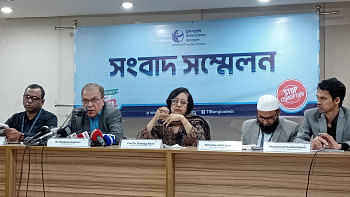Children in the grip of pornography

A young woman I know was telling me about her son, a student of class three, a few days ago. While fiddling with her son's tab, she found some disturbing sites -- all with adult or pornographic content. She was horrified but didn't know what to say to her son, what to ask, or even what approach to take, since a child so young isn't supposed to be aware of these things.
Why did he visit the sites? How did he even know about them? And how much did he actually understand? She felt hesitant about involving the father, since she had been the one to buy the tab for her son without his consent in the first place. She finally approached her son and tried to talk to him about it. She asked him what he liked to watch online, and warned him to stay away from violent and non age-appropriate content.
Soon her son opened up. He said that he had been searching for ways to make chocolate when these "weird" sites popped up suddenly, much to his surprise. She was visibly worried and said she couldn't sleep at night because of this. She had already disconnected the wifi internet at home, but this was also causing a furore in the household, since almost every member either used or was addicted to constant internet usage. So she knew that turning the wifi off was not a solution. But what could she do? How could she protect her child from this inappropriate content?
Children, especially school-going children often end up on porn sites with or without understanding what they are doing, from simply browsing the net. These sites are linked to very innocent and simple words like 'chocolate', 'ice-cream' and 'strawberry', words that young children are familiar with and might want to search on the net. Children today are exposed to the internet at a very early age. Parents are busy with work, chores at home, social responsibilities, and even personal entertainment, among other things. It becomes difficult to give the necessary time to children because of such preoccupations. Parents don't have the time to play with their children, or to explain things to them. How many parents today can say they read stories to their children? Or buy them story books?
Parents take comfort in the idea that as long as their children are at home, they are safe, which is not necessarily true. Children today study, watch TV, and play games on smartphones and tabs, and browse the internet at home. Children from the middle and high income groups live with various kinds of gadgets. I was surprised to find even children in the villages now spend their time in front of the TV screen. Although there are fields, open air, rivers, flowers and all other bounties of nature, yet even theirs is a childhood captive to technology.
A survey by Manusher Jonno Foundation in 2009 revealed that about 77 percent of school-going children in Dhaka city are either watching or have already watched pornographic material. A large number of them also get involved in the making of the material. That research was done a few years ago, and the government has enacted an act to control pornography, taking into consideration the revelations of this research. The law enforcers are also active in trying to address this issue. And yet, with the widespread use of smartphones/tabs/laptops, the availability of pornographic content, and its aggression into the lives of the children, has increased manifold than before.
Nowadays it's not just the cities, even the village shops are stocked up with x-rated material. Simple roadside shops carry them, and there is no check on who can access them. Laws do exist, but there isn't enough effort to enforce those laws. Anyone who wants to can watch porn, and those who don't know or do not want to, are still being shown such content by others who do like it. I came across such an example while talking to a family in Bogra. Their school-going son had brought home some songs from the shop, on a pen drive. When his sister wanted to listen to those songs, the boy himself was left dumbfounded after connecting the drive to the TV. A porn film started playing after just 3 or 4 songs. The son was horrified, and his sister was left speechless. She simply assumed that the child had brought the material intentionally. And of course a good telling off followed. But the boy kept denying having brought it. It is assumed that the local shopkeeper must have inserted it along with the songs. This is in fact how many children and adolescents, the main and very gullible targets of porn, get initially exposed to the material.
A couple of months ago, in October, I myself witnessed such a horrifying incident. A simple Google search about a renowned local institution revealed several scandalous video clips, not one or two, but more than a dozen, all in the same vein. Initially I thought the girl might have been trapped into being filmed like that. But I later found she in fact was the initiator. A large number of young people were already familiar with the clip.
Pornography or sexually explicit videos are nothing new for people. But even then, why this perverse desire to put your own private moments into the hands of strangers, just for fun? And yet it is commonplace now. Because it pays well, it sells well. A pornography related research expert recently said that locally developed content is more popular with audiences here, compared to content from abroad.
It is really incomprehensible why young people from educated families and reputed educational institutes would be involved in making pornographic content? Why would they risk their reputation and that of their family, friends, institutions they belong to? I want to understand what motivates them to such an extent? Don't they realise, despite their education, that this increases sexual violence against women in the society?
Another researcher of the study mentions that the videos coming out nowadays are far worse than those that were considered scandalous in the past. He also said that the number of child and adolescent users is increasing every day. The prevalence of smartphones, tabs, pads, laptops is making access to porn much easier. There are also different modes now—people are reading or privately listening to pornographic content, with the help of ear phones. How are parents or guardians supposed to put a check on that?
I cannot help but wonder where we are headed. The youth we consider our asset, a part of the same youth, while pursuing education from the lap of relative luxury, is getting used to porn, drugs and a generally lawless way of life. They are marketing themselves as sexualised objects.
As guardians we must be more proactive if we are to protect our next generations from the grip of pornography. We must give more time and attention to our children, we must teach them good values, and try to understand our children. Leaving children with open access to technology, for whatever reason and having no time to talk to them, is not justifiable. Of course, we have to allow children to use technology, as it is the necessity of the times, but we must also properly monitor how they use it. The most important thing is to increase our own knowledge about internet use. We must become more aware, of technology and of the society, and know what is happening and where. We must also support any steps the government takes to combat this social malady.
The writer works in communications.

 For all latest news, follow The Daily Star's Google News channel.
For all latest news, follow The Daily Star's Google News channel. 



Comments